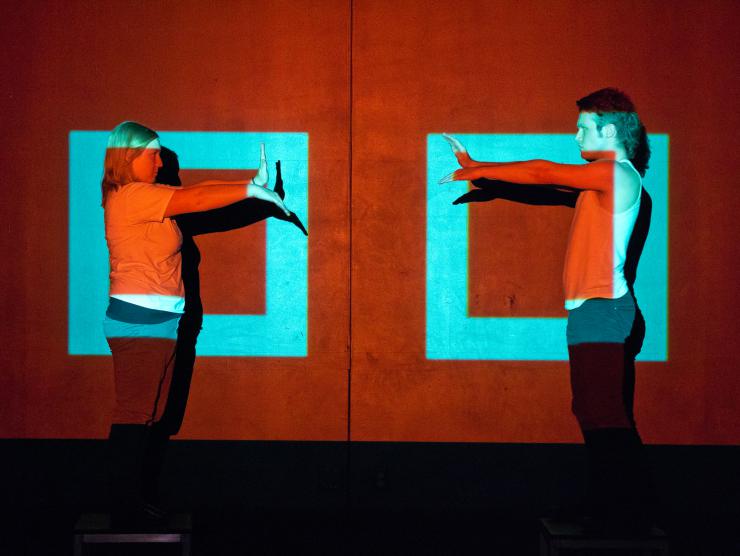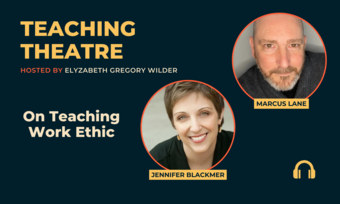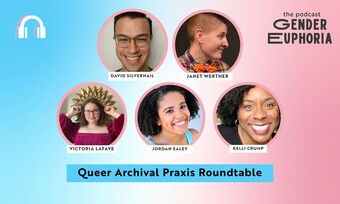Your Guide to Theatre Education
Towson University
In this series, David Dudley looks at the different models of theater education around the country through interviews, with the hopes that a new student will have an easier time finding the model that works for them.
Naoko Maeshiba is a performer, director, and choreographer. In 2002, she founded the Kibism performance lab. Naoko is currently the Program Director for Towson University's MFA in Theatre Arts.
***
David Dudley: When was Towson's Theatre MFA started? When did you join?
Naoko Maeshiba: It started in 1994 under the leadership of Juanita Rockwell. It was the first MFA program focusing on the creation of new work from the ground up. Over the years, the program has continued to evolve under each new leader with the constant intent to stay at the forefront of contemporary theatre practice. I took my place as artistic director in 2014.
David: What does Towson's program offer potential students?
Naoko: We offer intensive training in the art of self-excavation. Students go thorough a rigorous examination in a lab environment, gaining skills in self-directed research, devising, collaborating, and putting theory into practice. Our program is structured as an experimental process that challenges, expands, and develops each participant's individual artistic vision as well as their collaborative skills.
For this training to happen, we prepare a place where students can engage in serious study. We invite a small cohort of students into the program every other year, which allows us to provide individualized guidance and support within the spirit of ensemble. The curriculum is designed to support self-generative work, training students to be malleable, adaptable, and resilient. The twenty-four-month program culminates in the presentation of a work in progress as part of a festival of new works that is the exploration of the student’s personal aesthetic.
I would like this program to rediscover and nurture ‘being,’ not just ‘doing.’
David: What makes Towson different?
Naoko: We cultivate self-generative artists: artists who make work from scratch, radically examining how they live in the world, where they stand in all matters, and what it is that’s driving them. Unlike many MFA programs which focus on a specific artistic discipline such as acting or playwriting, we aspire to nurture total theatre artists who can cross the boundaries between disciplines and areas of specialty.
We are dedicated to educating and invigorating world citizens of theatre who engage actively in our local and global communities.
David: What are the guiding principles of the program?
Naoko:
- Investigation of self which involves rigorous examination of their stance in the world and source of their drive
- Ongoing inquisition into most basic assumptions in order to uproot and expose what hides behind them without settling with easy answers
- Exercising 360 degree perception of all aspects of their experiences and the world around them
- Testing boundaries within and outside of themselves; boundaries of disciplines, personal limitations, and cultures
- Working towards an integration of the physical, mental, and spiritual in order to access the full potential of their work
David: Following that, what's working?
Naoko: The cohort system and the support system given by peers, faculty, and guest artists have really supported the students to deeply engage into their exploration. We have been able to create a safe environment where students can try and fail. Our curriculum, which includes a diverse array of both practical and theoretical approaches within their classwork, encourages the students to think beyond boundaries of disciplines and cultures.

David: What kinds of challenges have you faced? How do you intend to approach them in future?
Naoko: It is a challenge to keep the students’ focus on inquiry, rather than result. We live in a world that is product-oriented. The MFA program is a lab; a place where our grad students can work and not worry about outside pressures or limitations. As they develop their work, we want them to ask themselves: Why am I doing what I’m doing? What is the point of this investigation? What exactly do I care about? And why? When they really dig deeply into themselves to find out the answers, they may not be so transparent at first, even to themselves. The students might have to reside in a murky, uncomfortable place. It may take them time to connect with that knowledge. I think it’s important for them to stay in this place, since mystery is where honesty lies. I would like this program to rediscover and nurture “being,” not just “doing.”
David: What's missing, in your opinion, from the current education or training programs available?
Naoko: I cannot speak for all programs, and I’m aware a few programs share some similarities with ours. But what I feel sometimes missing is the discussion about the most fundamental issues theatre is facing, and in our own creative processes: what is “originality;” what are models of theatre-making that best serve contemporary society; what is the nature of the relationship of artist and audience; what are our responsibilities to ourselves/our fellow artists/our communities; etc. We are so guarded that the process of questioning the obvious doesn’t often get practiced. We need to be constantly un-defining, disentangling, destroying, and rebuilding our habitual thinking, preconceived ideas, and assumptions. It is a gradual process to peel off one layer after another in order to reach the core—the very source of originality.
Another thing that might be missing is a focus on students as the driving force: the switch from faculty-driven to student-driven has to happen sometime during their residency. I think that’s healthy, especially in graduate school.
David: Who do you feel is the ideal candidate? Who are you trying to bring into the Towson family?
Naoko: Students who can self-initiate their creative process with passion and drive. Students who have a burning curiosity about themselves and the relevancy of their work in the current landscape. Students who can dive into the unknown without expectation . Students who can integrate their experience and knowledge in other art forms, disciplines, and fields with their work in theatre . Students who can embrace diverse points of view and connect with others from an honest place without judgment.
David: What do you hope your graduates do, once they complete the program?
Naoko: I hope they continue to engage self, others, and community with the moment-to-moment experience of the world through the creation and sharing of their work. I hope they work to cultivate a revolutionary spirit in our society, believing in the power of art. I hope they continue to create timeless, non-consumable art and still sustain their living as artists.
David: Success stories?
Naoko: While experimental theatre is a challenge as a lucrative business, our program has been existing for over twenty years as a result of tenacious endeavor with strong commitment. We maintain our excitement and hope for the growth of the program and the students. I consider this as a success.













Comments
The article is just the start of the conversation—we want to know what you think about this subject, too! HowlRound is a space for knowledge-sharing, and we welcome spirited, thoughtful, and on-topic dialogue. Find our full comments policy here
I love the direction of your MFA program: the cohort, the mindfulness, and creating an original product. However, your program does miss what a lot of programs miss--people like me. Mid career people who want to study and earn their MFA, but can't afford to move their entire family to a new place. We are already focused and engaged in our communities; a program like yours would give us wings.
Historically, many "mid-career" people - and older - have graduated from this program. Some have managed the move with their families, or in the case of ensemble artists, some have moved their entire ensemble to Baltimore, which is one of the more affordable cities in the US. And now that the program has been revamped to fit into 2 years instead of 3, it is an extraordinary option for many.
But when you have a job you love and you want to keep it, it is difficult to move your life.
I'm not sure what Towson could possibly do about this with their program. If you have a job you love and you want to keep it, intensive graduate study (a terminal degree like a MFA) is probably not for you.
I think the fact that it's a 24-month program is already a huge plus for people who can't afford/can't take time off for a 3 year MFA. At some point, you have to give credit where credit is due.
Julie I said I love the direction of the program and I am giving them the credit. As someone who wants to get better and increase my creativity base, I would like the opportunity to earn and MFA. However, I have a good job and in the current economy I want to keep my job and I want to get better.
Sounds like what might work for you is a distance MFA--Goddard has one in interdiscipinary arts. A couple of intensives a year when folks congregate, and the rest of the work is done from your home base.
Wonderful! Mindfulness in the arts is vital. It is the balance to training, the investigation and inclusion of self. I'm excite more educational programs are looking at this horizon. At the beginning of my career as touring teaching artist, I saw such a yearning for the opportunity to look inward.
By doing this, artists were able to empathize and connect deeper to their characters and their community. This need created my company, which also focuses on self-efficacy through mindfulness and play.
Very excited to hear more about this program.